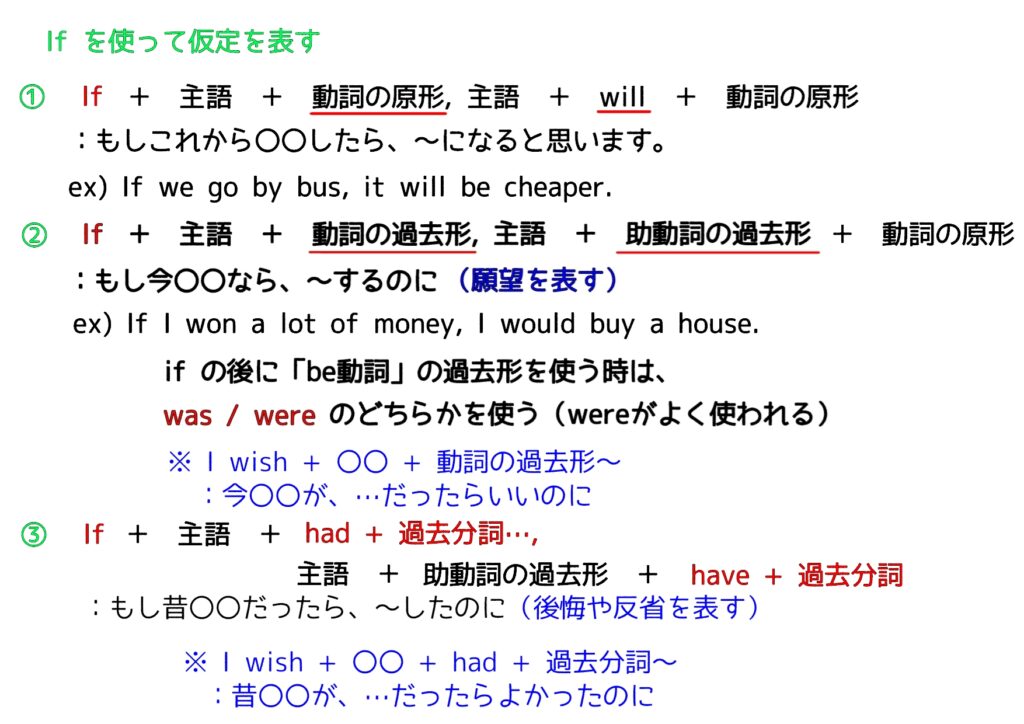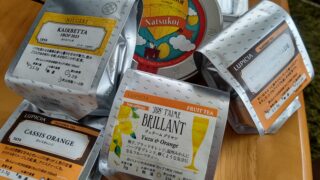第84回:「仮定法」の表現の一つ。shouldを活用する。

「万が一…」を表す方法です。心配性の方にとっては、ありがたい表現です。
Q. この記事で、一番大事なことって何?
A. 大事なことを、1枚の画像にまとめました。

いちいちノートにまとめるのが面倒だという方、また、
ノートにまとめることが苦手だという方は、ご活用ください。
※以下の内容を理解しておくことが、今回の記事においては大切になります。

[広告]
確かな英語力は、日々の継続から。
その継続を後押しする、第二言語習得理論に基づいた
オンライン英語学習プログラムがあります。
英語を使う人のための、確実なスキルアップが望める
7日間の無料体験はこちらから!

仮定法の表現を、深く理解する。
- 条件節において、最初の動詞がshould、were、またはhadである場合、ifを省略して動詞を節の先頭に置くことができます。これは特に形式的な英語や文学的な英語で行われます。また、この形式は仮定条件文(「もし…だったら何が起こるだろうか?」という質問に答える非現実的な条件文)でのみ使用されます。
- 例: Should any of this cost you anything, send me the bill. (= If any of this should cost …)
- 例: It would be embarrassing, were she to find out the truth. (= if she were to find out…)
- 例: Had they not rushed Jo to hospital, she would have died. (= If they hadn’t rushed Jo…)
- 通常、条件節にif … willを使用しません。ただし、主節の結果について話す場合にはif … willを使用することがあります。
- 例: Open a window if it will help you to sleep. (or … if it helps you to sleep; ‘Helping you to sleep’ is the result of opening the window)
- 例: I will be angry if it turns out that you are wrong. (not … if it will turn out…; ‘Turning out that you are wrong’ is not the result of being angry)
- リクエストや「もし…してくれるのなら」という意味で、丁寧にするためにはif … wouldを使用することもあります。
- 例: If you will/would take your seats, ladies and gentlemen, we can begin the meeting.
- 実際の条件文で何かを非難したい場合にもif … willを使用することがあります。
- 現実的な条件文では、if … happen to、if … should、またはif … should happen toを使用して、可能性はあるが非常に可能性は低いということについて話すことができます。話す英語では、if … happen toが最も一般的です。
- 例: If you happen to be in our area, drop in and see us. (or If you should [happen to] be…)
- ただし、話者が非常に可能性が低いか不可能と感じるif節での状態やイベントには通常このパターンを使用しません。
- 比較節では、as ifに続いて名詞句、-ing節、過去分詞(-ed)節、またはto不定詞を使用して、主節で説明を行ったり、何かのように見えるが実際にはそうではないことを述べることができます。(=「まるで〇〇のように振る舞ってるけど、実際は違うよ?」ということを表す。)
- 例: Magnus walked in as if nothing had happened.
- 例: His hands made a circular motion, as if steering a bus through a sharp bend.
- 例: When he caught the ball, Lee fell to the floor as if hit by a bullet.
- 例: As if to convince herself that Luis was really there, she gently touched his cheek.
- 注意点として、as ifの代わりにas thoughを使用することもでき、非公式な話し言葉ではlikeを同じ意味で使用する人もいます。
以上のように、条件文では異なる文法形式や表現が使用されます。文脈や意図に応じて適切に使い分けることが重要です。
具体例
- Hypothetical conditionals:
- Should you need any assistance, feel free to contact me. (= If you need any assistance…)
- Were I to win the lottery, I would travel the world. (= If I were to win the lottery…)
- Had they not arrived on time, the party would have been a disaster. (= If they hadn’t arrived on time…)
- Conditional clauses with “will”:
- Please let me know if you will attend the meeting. (or … if you are willing to attend…)
- If you will be patient, I will explain the situation to you.
- There’s no use in continuing if they won’t cooperate.
- Real conditionals with “happen to”:
- If you happen to see John, tell him I’m looking for him. (or If you should happen to see John…)
- If it should rain tomorrow, we’ll have to change our plans.
- Comparison clauses with “as if/as though/like”:
- He walked in as if he owned the place.
- The child screamed as though he had seen a ghost.
- She smiled at him as if to show her approval.
- The car sped by like a bullet, startling everyone.
Note: These examples are created for illustrative purposes and may not reflect real-world situations.
[広告]
TOEICのスコアを上げたいけれど、
まとまった勉強時間が取れなくて困っている…
なら、細かいスキマの時間を使いながら、
少しずつスキルを積み重ねてみてはどうでしょう。
スマホ1つでスコアアップが出来る、
オンライン講座のリンクはこちらから。

Q. この文法はどうやって使うのでしょうか?
A. 今回の文法を活用した会話文を見てみましょう。

Should I bring anything for the party tonight?
(今夜のパーティーに何か持っていった方がいい?)

Well, if you should happen to have some extra drinks, that would be great.
(まあ、もし余分な飲み物があれば持ってきてくれると嬉しいな。)

Sure, I’ll make sure to bring some wine and beer.
(もちろん、ワインとビールを持っていくよ。)

Thanks! And if you happen to see Tom on your way, could you ask him to bring some snacks?
(ありがとう!それともし途中でトムに会ったら、スナックを持ってくるように頼んでくれる?)

Of course, if I run into Tom, I’ll remind him about the snacks.
(もちろん、もしトムに会ったら、伝えておくよ。)
[広告]
ロゼッタストーン・ラーニングセンターで、最先端の教育制度を活用して英語を学びませんか?私たちは個々の学習ペースに合わせてeラーニングと対面教育を組み合わせ、柔軟な学習環境を提供しています。自宅でのeラーニングと対面教育のメリットを最大限に活かし、あなたの英語学習をサポートします。最新のテクノロジーと個別の指導が組み合わさった当センターで、自由な学習スタイルを体験してみませんか?英語学習を楽しく効果的に進めるための環境がここにあります。新たな一歩を踏み出して、新しい英語学習の旅に参加しましょう!

Q. この記事の要点は?
A. 仮定法を活用した表現について確認しました。
If 2: Conditional Clauses
- Hypothetical conditionals:
- Should, were, or had can be used at the beginning of the if-clause instead of using “if” in formal or literary English.
- This is used in unreal conditionals that answer the question “What would happen if…?”
- Avoiding “if… will”:
- We generally do not use “if… will” in conditional clauses.
- However, we can use “if… will” in requests or with the meaning of “if you are willing to” to be more polite.
- In real conditionals, when expressing disapproval, “if… will” can be used with emphasis on “will” in speech.
- “If… won’t” is used to express a refusal to do something.
- Expressing possibility in real conditionals:
- “If… happen to,” “if… should,” or “if… should happen to” are used to talk about something that may be possible but is not very likely.
- “If… happen to” is more common in spoken English.
- Comparison clauses:
- “As if” followed by a noun phrase, -ing clause, past participle clause, or to-infinitive is used to introduce a comparison with a situation described in the main clause.
- It explains or implies that something appears to be the case but is not necessarily true.
- “As though” can be used instead of “as if,” and in informal speech, “like” is sometimes used with the same meaning.
英会話を始めてみたいけれど、どのサービスが良いか分からない…
そんな方は、まず、この記事で3つのサービスを比べてみてはいかがでしょうか?
英語力を効率良く伸ばすことができるサービス3選です。

次回の文法解説は?
「もし、〇〇だったなら…」仮定法を使って、相手の立場に立つ。
この記事を作る際に参考にした文法の解説書になります。
すべて英語で書かれていますが、練習問題が付いてます。
イギリス英語なので、スペル等の表記が異なる部分もありますが、
「使い方を練習したい」「繰り返し問題を解きたい」
という方は、使ってみても良いかもしれません。

関連記事一覧
[広告]
日本人の講師と学んで、英語を使う不安を減らし、
ネイティブの講師とのレッスンで、学んだことを活用する
そんな、体系的な英会話のレッスンを提供している、
オンライン英会話スクールのリンクはこちら。

他の文法解説記事を検索できます。


-320x180.jpg)
-320x180.jpg)


-320x180.jpg)
-320x180.jpg)
-320x180.jpg)





コメント